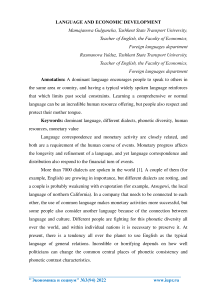Language and economic development
Автор: Mamajanova G., Raxmanova Yu.
Журнал: Экономика и социум @ekonomika-socium
Рубрика: Основной раздел
Статья в выпуске: 3-2 (94), 2022 года.
Бесплатный доступ
A dominant language encourages people to speak to others in the same area or country, and having a typical widely spoken language reinforces that which limits past social constraints. Learning a comprehensive or normal language can be an incredible human resource offering, but people also respect and protect their mother tongue.
Dominant language, different dialects, phonetic diversity, human resources, monetary value
Короткий адрес: https://sciup.org/140291399
IDR: 140291399
Список литературы Language and economic development
- Carliner, G. (1981) Wage differences by language group and the market for language skills in Canada. Journal of Human Resources 16 (3), 384-399.
- Crystal, D. (1987) The Cambridge Encyclopedia of Language. Cambridge, UK: Cambridge University Press.
- Dustmann, C. (1994) Speaking fluency, writing fluency and earnings of migrants. Journal of Population Economics 7, 133-156.
- Espenshade, T.J. and Fu, H. (1997) An analysis of English language proficiency among U.S. immigrants. American Sociological Review 62, 288-305.
- EDN: HEZKWB
- Friedman, M. (1953) The methodology of positive economics. In M. Friedman. Essays in Positive Economics (pp. 3-43). Chicago, IL: University of Chicago Press.
- Grenier, G. (1987) Earnings by language group in Quebec in 1980 and emigration from Quebec between 1976 and 1981. Canadian Journal of Economics 24, 774-791.
- Portes, A. and Schauffler, R. (1994) Language and the second generation: Bilingualism yesterday and today.International Migration Review 28 (4), 640-661.
- EDN: HIEAMN
Статья научная


